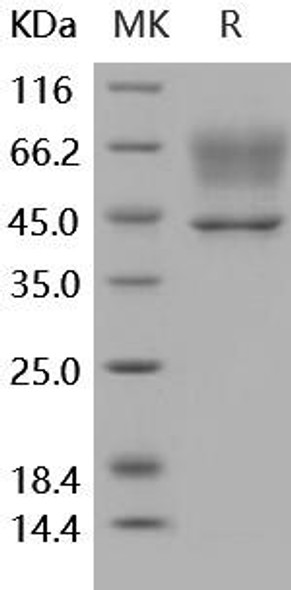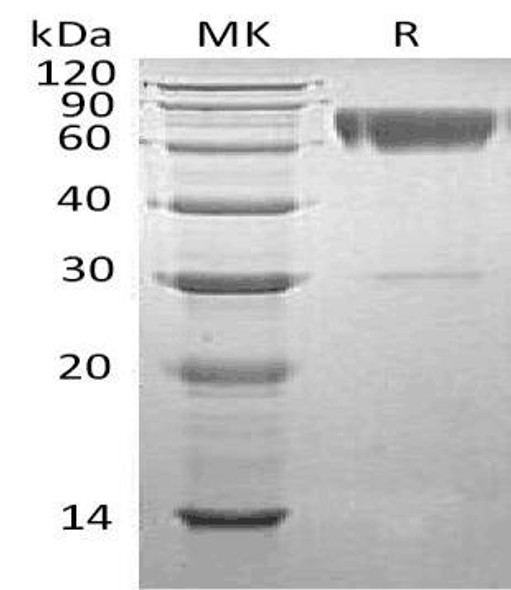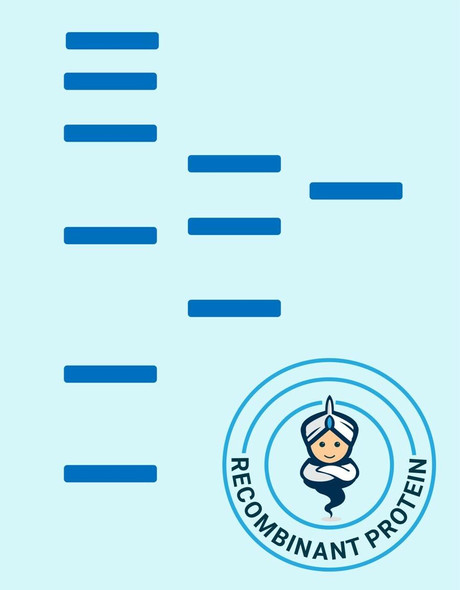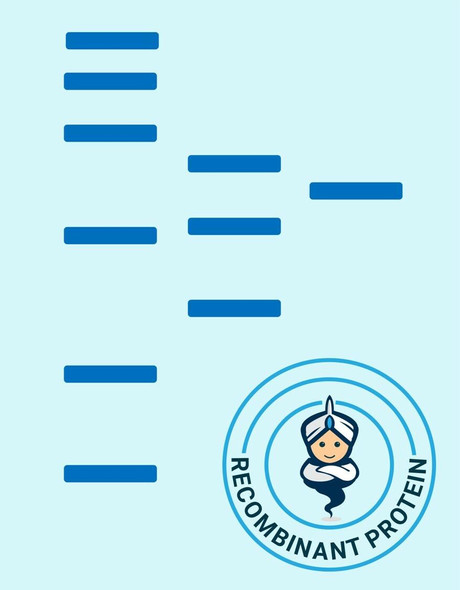Description
| Product Name: | Human SERPINA3 Recombinant Protein |
| Product Code: | RPPB4813 |
| Size: | 100µg |
| Species: | Human |
| Target: | SERPINA3 |
| Synonyms: | Alpha-1-antichymotrypsin, ACT, Cell growth-inhibiting gene 24/25 protein, SERPINA3, AACT, A1ACT, GIG24, GIG25, MGC88254. |
| Source: | Human Serum |
| Physical Appearance: | Sterile Filtered White lyophilized (freeze-dried) powder. |
| Formulation: | Lyophilized from 0.02M NH4HCO3. |
| Solubility: | It is recommended to reconstitute the lyophilized human A1ACT in phosphate buffer pH > 7.0 containing 0.15M NaCl. |
| Stability: | Human SERPINA3 although stable at room temperature for 3 weeks, should be stored between 2-8°C. |
| Purity: | Greater than 99.0%. |
Alpha 1 ACT is an early-stage acute-phase plasma protein and a serpin that preferentially inactivates chymotrypsin, cathepsin G, and chymase. Alpha-1- ACT, a serine protease inhibitor, is tightly associated with amyloid plaques in Alzheimer's disease (AD) and in normal aged human and monkey brain.Regulation of the serine proteases and serine protease inhibitors plays an important role in neuromuscular differentiation. Prostate specific antigen (PSA), a chymotrypsin-like serine protease, is predominantly complexed to Alpha-1-ACT.
Human Alpha-1 AntiChymotrypsin produced from normal human serum having a molecular mass of 68kDa.
| UniProt Protein Function: | SERPINA3: Although its physiological function is unclear, it can inhibit neutrophil cathepsin G and mast cell chymase, both of which can convert angiotensin-1 to the active angiotensin-2. Belongs to the serpin family. 3 isoforms of the human protein are produced by alternative splicing. |
| UniProt Protein Details: | Protein type:Secreted, signal peptide; Secreted Chromosomal Location of Human Ortholog: 14q32.1 Cellular Component: extracellular space; extracellular region; intracellular; nucleus Molecular Function:serine-type endopeptidase inhibitor activity; protein binding; DNA binding Biological Process: regulation of lipid metabolic process; maintenance of gastrointestinal epithelium; acute-phase response; inflammatory response |
| NCBI Summary: | The protein encoded by this gene is a plasma protease inhibitor and member of the serine protease inhibitor class. Polymorphisms in this protein appear to be tissue specific and influence protease targeting. Variations in this protein's sequence have been implicated in Alzheimer's disease, and deficiency of this protein has been associated with liver disease. Mutations have been identified in patients with Parkinson disease and chronic obstructive pulmonary disease. [provided by RefSeq, Jul 2008] |
| UniProt Code: | P01011 |
| NCBI GenInfo Identifier: | 112874 |
| NCBI Gene ID: | 12 |
| NCBI Accession: | P01011.2 |
| UniProt Related Accession: | P01011 |
| Molecular Weight: | |
| NCBI Full Name: | Alpha-1-antichymotrypsin |
| NCBI Synonym Full Names: | serpin family A member 3 |
| NCBI Official Symbol: | SERPINA3�� |
| NCBI Official Synonym Symbols: | ACT; AACT; GIG24; GIG25�� |
| NCBI Protein Information: | alpha-1-antichymotrypsin |
| UniProt Protein Name: | Alpha-1-antichymotrypsin |
| UniProt Synonym Protein Names: | Cell growth-inhibiting gene 24/25 protein; Serpin A3Alpha-1-antichymotrypsin His-Pro-less |
| Protein Family: | Agmatine coumaroyltransferase |
| UniProt Gene Name: | SERPINA3�� |
| UniProt Entry Name: | AACT_HUMAN |









